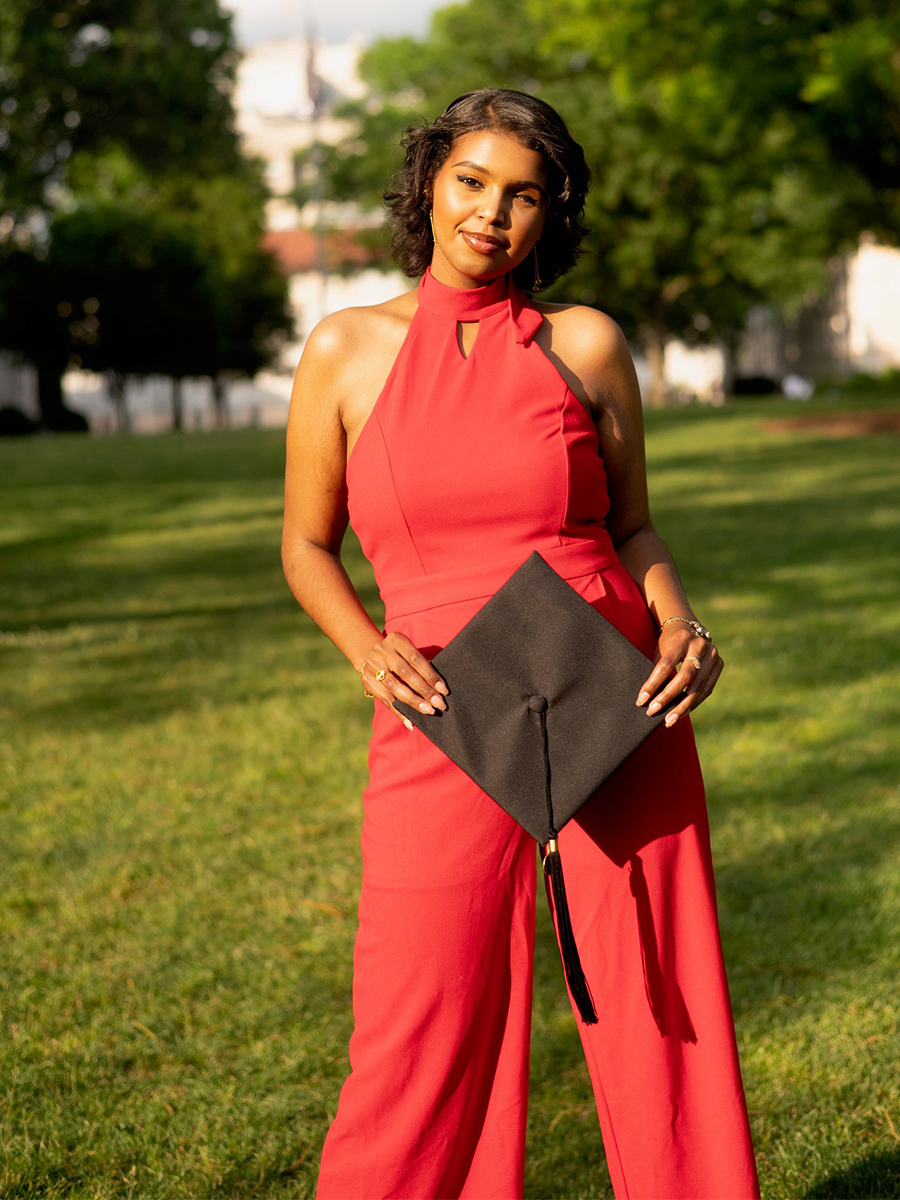
Mari Ismail is one of only 30 nationwide recipients of the highly competitive Soros Fellowship.
Recent Emory College graduate Marwah (Mari) Ismail, who delivered a widely popular talk on resilience after battling serious health issues during her undergraduate career, has won a 2025 Paul & Daisy Soros Fellowship for New Americans.
The 2024 graduate is one of just 30 nationwide recipients of the highly competitive scholarship granted to immigrants or children of immigrants. The two-year fellowship, awarded in recognition of the potential to make significant contributions to U.S. culture and society, comes with $90,000 for graduate study expenses.
“Mari has a remarkable journey, and it has all but begun,” says Samuel Candler Dobbs Professor of Philosophy George Yancy, who first met Ismail as a first-year student peering through a Zoom screen, then later admitted her to his graduate-level seminar courses as an undergraduate student.
“She has experienced what so many of us would think of as negatives and plowed through them by seeing them as opportunities,” Yancy adds. “We will all benefit from what she becomes.”
The daughter of Somali refugees who will start Columbia Law School in the fall, Ismail is the fourth Emory alumnus to win the prestigious fellowship. She has spent a gap year working as a trademark analyst for the Atlanta law firm Kilpatrick Townsend & Stockton — something of a break after insisting on attending Emory full-time while undergoing treatment for a rare cancer that took one of her eyes.
“It’s been a lot these last four years, but I was never alone because I had people who had faith in me,” Ismail says. “It’s an absolute honor that the Soros Foundation has the faith to invest in me, and that just motivates me to continue working hard.”
Born at what is now Emory Decatur Hospital, Ismail grew up in the country’s largest Somali immigrant population in Minnesota. As the oldest of four children raised by a single mother, she embraced expectations to set an example for her siblings and others in the community by earning top grades and working since she was 14.
Ismail pursued those expectations — and gave a glimpse of her determination — when she moved away to attend Emory as a QuestBridge Scholar.
The culture shock reinforced that she made the right decision. Originally planning a pre-med major, she found that studying different religions allowed to her connect with a wide variety of people she hoped to help through a career in law.
“Some students just want to know the answers for an exam,” says James Hoesterey, the associate professor of religion who served as Ismail’s honors thesis adviser on research investigating the Somali Civil War’s impact on religious adherence.
“That is not Mari,” he adds. “Mari has the moral conviction to want to make a difference and the intellectual curiosity, reflection and, frankly, sheer grit to do it.”
Her work outside of class opened the path to law school. Ismail co-created the Kappa Alphi Pi pre-law fraternity at Emory and, among other activities, served as a Congressional Council Judge for the Student Government Association.
She also worked as an intern in two Congressional offices, first in the Minneapolis office of U.S. Senator Amy Klobucher and then on Capitol Hill with U.S. Representative Hakeem Jeffries. It was when she was working in D.C., discovering a passion for legal policymaking, that she fell ill.
What had been treated as childhood glaucoma turned out to be a rare malignancy. Ismail traveled to the Mayo Clinic for treatment of the rapidly spreading cancer, only after successfully advocating for the ability to continue her junior year by studying remotely.
She talked her way into an intensive Italian course while hospitalized and recovering from a pulmonary embolism, more worried about a summer study abroad program than her last round of chemotherapy.
“Something in me told me that if I come out of this, I don’t want my life to fall behind,” Ismail says. “And if I died, at least I know I was working hard until the end.”
The mindset paid off. Ismail studied that summer in Bologna and graduated with a minor in Italian Studies.
“Whatever Mari sets her mind to, she does,” says Christine Ristaino, director of the Emory College Language Center and Italian professor of practice who led the Italy trip and later included Ismail on a student research team for the second annual Climate on Culture Global Conference in Ireland. “She has accomplished so much, but perhaps more importantly, she knows who she is.”
It is a hard-won confidence. Ismail wore an eye patch and a prosthetic when she first returned to campus. Both proved distractions when people talked with her.
That prompted Ismail to make two decisions: Ditch the devices to accept her new appearance and apply to share her story at TEDxEmory. Her 18-minute talk to a packed audience was among last year’s most popular sessions.
“It was the perfect moment to close that chapter,” Ismail says. “I was blind in that eye since I was 14, so I was used to that. I just wanted to show others it was ok, because I could always see my future.”
Learn more about scholarshipsStudents interested in learning more about the Paul & Daisy Soros Fellowship and other prestigious awards should contact Megan Friddle in Emory's National Scholarships and Fellowships Program, now part of the Pathways Center. Find more information or schedule an appointment through the National Scholarships and Fellowships Program website. |
